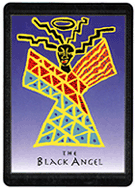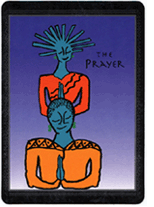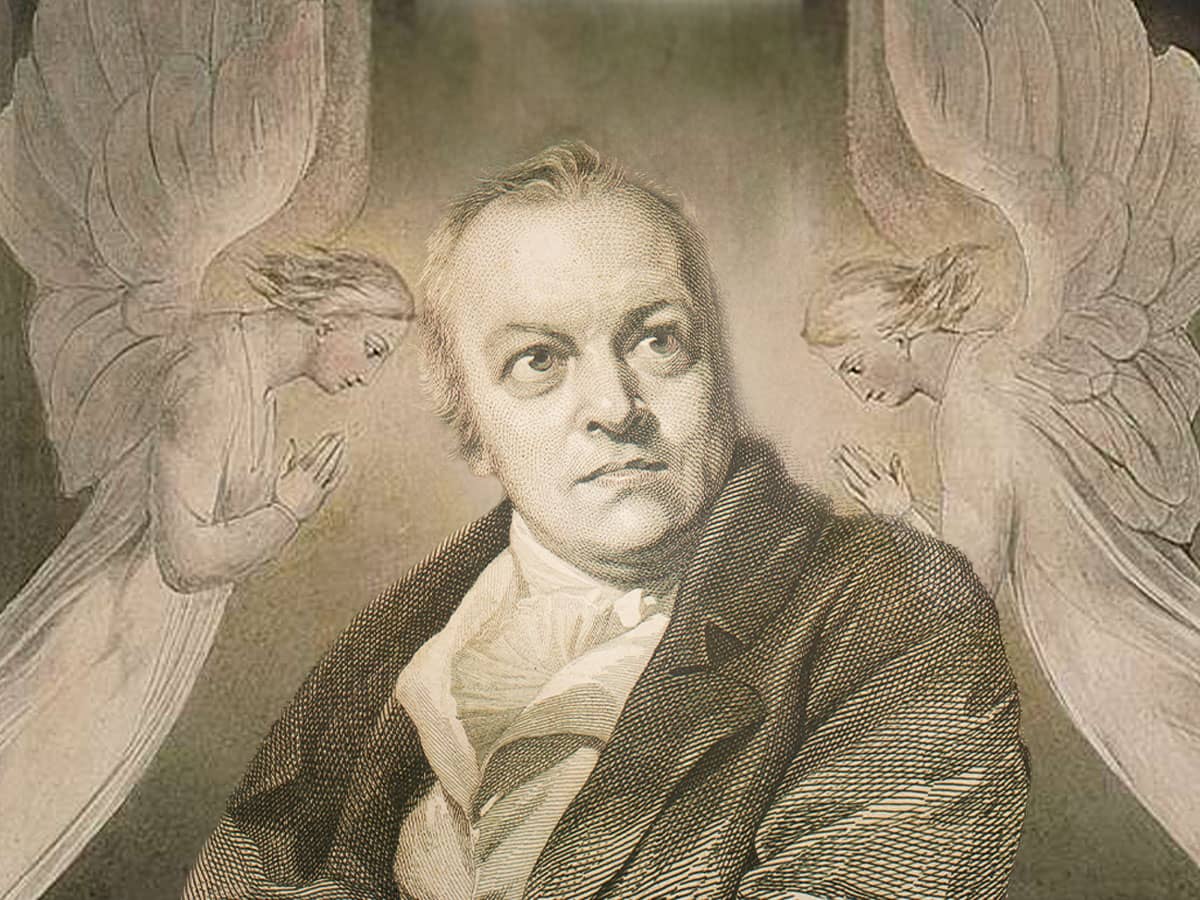Reprinted from Common Boundary magazine, with permission of the author.
Andrea Canaan, an African-American social worker who lives in Jamaica Plains, Mass., discovered the Black Angel cards last year. Since then, she has introduced these evocative symbols--termed "a tool of discovery" for black women--into her psychotherapy practice. She may suggest, for example, that a client select a card that attracts her. She then asks, "Why did you choose it or why did it choose you?" The vibrant, bold, archetypal images, with names like Sun Daughter, Braider, Drummer, Joker--tap deep feelings and intuitive knowledge, according to Canaan. "Like the Rorschach inkblot test, these cards go deep into the unconscious," she says.
 The 36 cards that make up the Black Angels became a grassroots phenomenon in the African-American community after their publication by a small California publishing firm in 1997. HarperSanFrancisco then introduced a new edition of the cards and accompanying guidebook, "Black Angel Cards: A Soul Revival Guide for Black Women," concluding a long birth cycle on the part of their creator, Earthlyn Marselean Manuel.
The 36 cards that make up the Black Angels became a grassroots phenomenon in the African-American community after their publication by a small California publishing firm in 1997. HarperSanFrancisco then introduced a new edition of the cards and accompanying guidebook, "Black Angel Cards: A Soul Revival Guide for Black Women," concluding a long birth cycle on the part of their creator, Earthlyn Marselean Manuel.
At 4 o'clock one morning in 1996, Manuel awoke from a dream and sprang out of bed. Feeling a presence in the room, she began searching for an intruder. She heard herself muttering the words, "black angels, black angels." Moments later, she remembered her dream: A gigantic female with thick dark hair and ebony features had appeared to her, speaking of black angels. This spiritual presence was what Manuel says she felt infusing her bedroom. She wrote down the names of black-angel archetypes before returning to bed.
When she reawakened, Manuel called a close friend, Bola Cofield, and asked, "Where can I get the Black Angel cards?" then described the cards in detail. "They don't exist," Cofield told her. Manuel then paced her apartment all day. "I wasn't into angels," she said, "but I had a lot of information and messages inside that I had to write down."
 After about four weeks of feeling possessed by intense energy, Manuel had created the set of 36 cards and a guidebook. First, Manuel had composed messages relating to each angel. Then, having never done any artwork, she hesitatingly picked up three colored felt-tip pens and a yellow highlighter. One by one, she drew the images she could see in her head.
After about four weeks of feeling possessed by intense energy, Manuel had created the set of 36 cards and a guidebook. First, Manuel had composed messages relating to each angel. Then, having never done any artwork, she hesitatingly picked up three colored felt-tip pens and a yellow highlighter. One by one, she drew the images she could see in her head.The process spawned what Manuel considers her own healing from the legacy of racism: self-hate. She was born into a Creole family--only the second generation from slavery. Her father, whose parents as children were slaves, was 60 when she was born. "My parents were rooted in slavery," Manuel, now 46, recalls. "So that's what I walk with." Manuel now resides in Oakland,California.
Although she had several distinguished careers in her past--including social-science researcher, community organizer, and corporate-development consultant--Manuel, in her heart, believed she was a writer.
Before her dream, she had begun a doctoral program in transformation and human change at the California Institute of Integral Studies (CIIS) and quit a lucrative job in the corporate world to write. Creating the cards affirmed this life change.After teaming up with a friend from CIIS who wanted to form a publishing company, Manuel brought out the first edition of the cards. Soon, mental-health workers reported using the angels, finding that the archetypes helped clients speak of issues previously avoided. A nun took the cards into a prison, where she found they encouraged spiritual discussions with inmates. Young girls loved the images--"I am the queen" or "I am the poet," they boasted. The new edition of the cards, Manuel hopes, will now bring the Black Angels to a wider community--"to anyone who wants to do soul-revival work. There is light and angelic energy in blackness, and we all need to learn that," she says.

